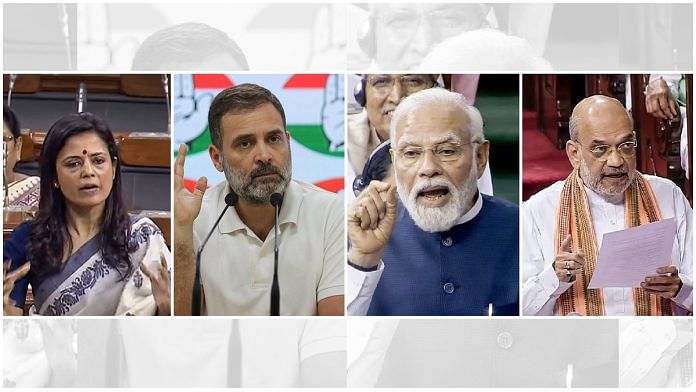The action-packed monsoon session of Parliament that concluded Friday will not just be remembered for the no-confidence motion that the Opposition moved against the Narendra Modi-led NDA government, or the frequent disruptions that both the Houses witnessed. The Opposition might be gloating that they could get the PM to finally address the House on Manipur among other issues.
Between the logjam, protests, shouting in the well, suspension of members and frequent adjournments, there was another highlight of this monsoon session. It provided an opportunity to hear our politicians debate in the House — a quintessential feature of Parliamentary democracy — even if occasionally. Something that has become increasingly rare. The bill to replace the Delhi services ordinance saw eight hours of discussion in the Rajya Sabha. In the Lok Sabha, 26 MPs participated in the debate. Parliament is finally talking. And that is why it is ThePrint’s Newsmaker of the Week.
The debate on the no-confidence motion also gave a glimpse of the views different Opposition parties hold on pressing issues facing the country and their assessment of the incumbent dispensation in power. With less than a year to go for the Lok Sabha polls, the voters will only benefit from the views expressed in the “temple of democracy”. Only an informed citizenry can be expected to make wise electoral choices.
Also read: Modi’s speech takes us back to India’s most dangerous decade — the many challenges of 1960s
The decline in debating culture
In the good old days, Parliament has been witness to stalwart MPs such as Indrajit Gupta and Bhupesh Gupta who through their powerful debates in the House made the government bow to their demands.
But in recent times, debates and discussions have become a casualty as animosity between the treasury and Opposition benches grew. The last time Parliament witnessed spirited discussion in the House was when the three contentious farm laws – now withdrawn – were placed in the Rajya Sabha in 2021. It’s a different story though that the House witnessed unruly scenes, forcing the Chair to suspend several members.
The silver lining of the just concluded monsoon session was seeing parliamentarians cutting across party lines participate in discussion. But before the ‘debate’ returned to Parliament, it was business as usual for our politicians, even in this session—no business at all.
Barring the debate on Delhi services bill and the no-confidence motion, for the better part of the session, the Opposition in both the Houses – Lok Sabha & Rajya Sabha – continued to obstruct and boycott proceedings, demanding that PM Modi make a statement on Manipur in Parliament. Manipur is the most important issue today, but in its shadow and in the interest of their politics, India’s politicians washed away key business hours in a session that saw nearly a dozen bills passed without considerable debate. Now that works fine for the government.
But the Opposition missed an opportunity to be heard.
Take, for example, the passage of the Digital Personal Data Protection Bill. In the making for six years, it was passed in 50 minutes in Lok Sabha on 7 August. Only 8 MPs, including two from BJP, participated in the debate. A majority of the Opposition, who have been shouting their voice hoarse over how the government is not allowing them to speak, chose to walk out when the bill came up for discussion. On Thursday, the Rajya Sabha passed the Pharmacy (Amendment) Bill within three minutes after it was taken up.
The Lok Sabha passed 22 bills in its 17 sittings, a majority of them without discussion. In all, this monsoon session was among the third least productive session of the 17th Lok Sabha with over 59 hours lost to interruptions and forced adjournments in the lower house.
The old timers are concerned about the frequency and nature of disruptions. Unlike in the past when there was a general bonhomie among members, now there is hardly any interaction between the treasury benches and opposition in Parliament. The animosity has grown.
The 2022 monsoon session is a case in point. It saw legislative business come to a grinding halt. MPs protested throughout the session, not only inside the House but also outside and for the entire night. As many as 27 Opposition MPs from both the Houses were suspended.
The 2021 monsoon session too, witnessed high drama with Opposition MPs climbing on reporter’ table in Rajya Sabha, tearing and hurling papers at the Chair and boycotting House proceedings.It ended up being the least productive of the six sessions held since 2019, after Narendra Modi government came to power for the second time.
(Edited by Anurag Chaubey)



